|
"Masonic"
Hymen
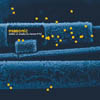 'Technoir', the first Hymen Records compilation was one of the best experimental compilations ever. Showcasing then-nobodies along with exclusive cuts from the popular Ant-Zen post-industrial roster, critics everywhere began to pay attention to the growing Hymen sub-label. 'Masonic' has a hard act to follow, but Hymen's evolution into "IDM for Rivetheads" and its ability to distance itself from the parent label paid off. With even the best of compilations, there are going to be at least some misses among the hits, so rather than humiliate those who do not shine as brightly (or are as dim as eclipses), I'll only focus on some of the very best of the bunch. If I had to choose the best track of the entire CD, then Beefcake would take the proverbial cake... errrr yeah.
'Technoir', the first Hymen Records compilation was one of the best experimental compilations ever. Showcasing then-nobodies along with exclusive cuts from the popular Ant-Zen post-industrial roster, critics everywhere began to pay attention to the growing Hymen sub-label. 'Masonic' has a hard act to follow, but Hymen's evolution into "IDM for Rivetheads" and its ability to distance itself from the parent label paid off. With even the best of compilations, there are going to be at least some misses among the hits, so rather than humiliate those who do not shine as brightly (or are as dim as eclipses), I'll only focus on some of the very best of the bunch. If I had to choose the best track of the entire CD, then Beefcake would take the proverbial cake... errrr yeah.
Being completely fascinated by the consistently incredible output of these sleek plunderphonic masters, it was hard not to fall in love with their eclectic contribution to Disc One. Imagine an ADD-afflicted music prodigy composing a 4 minute track, and you'll get a sense of "ct2": DSP-effected drill n' bass, cinematic strings, and some jazzy horns. The king of sub-bass, Scorn (a.k.a. Mick Harris of Napalm Death and Painkiller), graces the same disc with more of his highly original dark dub on "The Distance Between". Picking up where his last Hymen gem ('Greetings From Birmingham') left off, this should hold over his fans temporarily until the 'Governor' EP and 'Plan B' CD, both due out shortly. Funkstorung's "Beinh" (from one of their Musik.Aus.Strom 12" releases) mixes machine clangs with overdriven bass pulses and clever lowpass filtering. Schizophrenic breakbeat wunderkind Aaron Funk drops another bizarre cut entitled "Parasitus" under his Venetian Snares moniker that is very much in line with his Planet Mu material. The disc ends with Sonic Draglogo's dirty 80's-esque pop song "Sister". Infested with distortion, banging drum loops, and quirky guitar hooks, this is quite possibly the weirdest thing Hymen has ever attached its name to... and I can't stop playing it. Gridlock open the second disc with the ambient "36:6:115." For the uninitiated, this track might almost be seen as uncharacteristic of the Hymen sound, but then the duo's rhythmic barrage bursts out of the speakers sometime around the 3 minute mark, and it all becomes clear. Somatic Responses offer "Whatever," a shattered breakbeat track with otherworldly strings and relentless noisy squelches. I never really got into their 'Augmented Lines' album, but now I understand what the fuss is all about. While the electroclash movement has embraced some of the crappiest retro new wave garbage possible, acts like Lilienthal, Red Sparrow, and Bochum Welt entertain with their respective oldschool sounds that are far more deserving of the attention wasted on the likes of Fischerspooner. In the midst of all this 8 bit glory, Xanopticon plops out a heaping pile of Squarepusher diarrhea on "Phase", exploding stuttering beat fragments and undigested corn kernals all over the place. This guy could be the next Venetian Snares. And you can fucking quote me on that. In that same vein, Fanny (formerly of punk heroes The Exploited) closes out this beefy compilation with an incoherant slab of cut-up, mashed-up electronic junk noise rhythms. So in conclusion: Hymen makes Warp seem gay as a cricket, and Alicia Keys is really hot. I mean, she's really really hot. - Gary Suarez
samples:
"American Breakbeat Rebuilt"
Klang Krieg
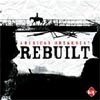 The vast worldwide sea of laptop and desktop musicians has simply become far too predictable with
atonal noise-bursts and rhythmic clicking. While the revisit of Klang Krieg's 'American Breakbeat'
album has some wonderful highlights, it's almost way too excessive at a staggering 34 tracks.
Presented here are remixes and reinterpretations of the original release—29 contributions from
North American electronic artists—by electronic artists from (almost*) elsewhere in the world.
[*Note to Klang Krieg: Mexico is still part of North America.]
Tracks like the reinterpretation of Matmos's "Count Tweekula" from Japan's Sonic Dragolo add a clever and even more comical twist by hijacking j-pop and exotica influences, cutting and pasting them into a vocalized mix that would make Ms. Solex proud. Chris Wood's string arrangement on Timeblind's "Jitter" is possibly one of the most beautiful songs on the compilation along with Syntetika's labelmates, Ambidextrous, (do yourself a favor and re-read the Syntetika review) make a serene, languid, melodic reconstruction of "Salty" by Blink Blink. I'm also epecially fond of "Melancholic Music Box," the Rosy Parlane reinterpretation of Hrvatski's "Insect Digestion Melody," reformatted for a thunderous music box and the Fibla remix of Marumari's "Super Botany," with pleasant Morr-like guitar sounds that easily jumps the tracks from the nerdy laptop boy express into the chin-scratching pseudo-electronica post-post-post rock shuttle. There's too many electro-fart remixes of Kid 606, however, and the good parts just don't seem to go on long enough. At the super-cheap price I paid for this set, however, those few low points can easily be overlooked. - Jon Whitney
The vast worldwide sea of laptop and desktop musicians has simply become far too predictable with
atonal noise-bursts and rhythmic clicking. While the revisit of Klang Krieg's 'American Breakbeat'
album has some wonderful highlights, it's almost way too excessive at a staggering 34 tracks.
Presented here are remixes and reinterpretations of the original release—29 contributions from
North American electronic artists—by electronic artists from (almost*) elsewhere in the world.
[*Note to Klang Krieg: Mexico is still part of North America.]
Tracks like the reinterpretation of Matmos's "Count Tweekula" from Japan's Sonic Dragolo add a clever and even more comical twist by hijacking j-pop and exotica influences, cutting and pasting them into a vocalized mix that would make Ms. Solex proud. Chris Wood's string arrangement on Timeblind's "Jitter" is possibly one of the most beautiful songs on the compilation along with Syntetika's labelmates, Ambidextrous, (do yourself a favor and re-read the Syntetika review) make a serene, languid, melodic reconstruction of "Salty" by Blink Blink. I'm also epecially fond of "Melancholic Music Box," the Rosy Parlane reinterpretation of Hrvatski's "Insect Digestion Melody," reformatted for a thunderous music box and the Fibla remix of Marumari's "Super Botany," with pleasant Morr-like guitar sounds that easily jumps the tracks from the nerdy laptop boy express into the chin-scratching pseudo-electronica post-post-post rock shuttle. There's too many electro-fart remixes of Kid 606, however, and the good parts just don't seem to go on long enough. At the super-cheap price I paid for this set, however, those few low points can easily be overlooked. - Jon Whitney
samples:
ENON, "HIGH SOCIETY"
Touch and Go
 "Hey you! Come on ever here! You've just been chosen!" Dance punk waving away from retro futurist flourescent arcades of dayglo nothing brought into the radioactive bubblegum world by the TV eye trio Enon - bright corners of 'High Society' seem rerouted from obvious drug pun. Initially "Old Dominion" rocket-rushes from speakers in chunky rockin' populous frenzy, twisting and spitting tuneful as if atomic men had shaved the cartoon kitten, and brought on irreal visions of faceless ladies walking poodles. These are the finest rockpops tune vibrations to wobble my eardrums since that Wire EP you should all have heard by now. You know John Schmersal used to be guitarist in that great Brainiac band from Dayton, Ohio that stopped just as they peaked when singer Tim Taylor's car crashed and killed him? John's been busy since then, relocating to do the Enon thing in New York, with a clutch of seven inches and between two and five albums depending on which way you cut it. To find out which way you'd cut the cake, visit the band's hyper TV hellnation website (www.enon.tv), where you will also find more sounds including monthly net-only tracks. Since the excellent quirky 'Believo!' album there have been at least three big shifts in Enonsound. There's a catchier pop approach to gadget strewn mix'n'scratch songfighting and a fuller, heavier production, courtesy of Girls Against Boys' Eli Janney. New bass-singer-synthist Toko Yasuda, formerly of The Lapse and Blonde Redhead, brings some high vocal counterpoints and leads to offset John's increasingly all over the range bunnyhop singing. She takes the lead on four of the fifteen songs, and the first of these, "In This City," is a surprising sugarpop confection with breakbeat backing and an almost 'J-Pop' feel. Lots of silly effects are chucked on the John's vocals, and often the sillier the better, as on the most Brainiac-Electroshock friendly tune "Native Numb," but Enon can just as easily play it straight and get away quick after writing a killer tune. Just take for instance the insanely catchy hi-energy summerfun tones of "Salty" (Toko's finest lead) followed languidly by the almost Ray Davies bitter mellowness of the title track, with it's sax and strings. Take the sweet drowsy lullaby "Count Sheep" and put it in your pipe and smoke it before "Carbonation" business kills the radiopop active-kids. Meanwhile "Window Display" seems tailor made for radio stations to blitz the airwaves, even if it seems to be a song about marrying an android and breaking her remote control. Toko seems to play the part of the remote malfunctioning displaydroid on "Disposable Parts" where she sings of the futurejoy of replacing organs and limbs, whilst John morphs into a impenetrable deep voiced daftbot. Underneath the almost childish robot infatuation there are perhaps more serious themes of alienation and disconnection lurking. Another song that'll have old Brainiac fans grinning is the manic "Pleasure and Privelige," with it's urgent urges to wave fingers in the air. The most affecting song is the perky "Natural Disasters," especially the bittersweet reversesynth middle eight, and it's hard to hear the chorus without being reminded of Tim's tragic crash, as John sings a song of moving on, keeping playful whilst some people want to draaag him back - it's probably the kind of anti-elegy Tim would've smiled at. Like the forthcoming Wire smash "Nice Streets," this is an addictive pop fix that easily trounces all those retrotrendy Electroclashers and rollrock-poseurs to a multifractured pulp. These songs hum with experigressive provivalist life force and summertime hues. If this band aren't getting offered big dollar studio deals, it's just more proof that biglabel A&R dudes have ears full of pudding, as usual. - Graeme Rowland
"Hey you! Come on ever here! You've just been chosen!" Dance punk waving away from retro futurist flourescent arcades of dayglo nothing brought into the radioactive bubblegum world by the TV eye trio Enon - bright corners of 'High Society' seem rerouted from obvious drug pun. Initially "Old Dominion" rocket-rushes from speakers in chunky rockin' populous frenzy, twisting and spitting tuneful as if atomic men had shaved the cartoon kitten, and brought on irreal visions of faceless ladies walking poodles. These are the finest rockpops tune vibrations to wobble my eardrums since that Wire EP you should all have heard by now. You know John Schmersal used to be guitarist in that great Brainiac band from Dayton, Ohio that stopped just as they peaked when singer Tim Taylor's car crashed and killed him? John's been busy since then, relocating to do the Enon thing in New York, with a clutch of seven inches and between two and five albums depending on which way you cut it. To find out which way you'd cut the cake, visit the band's hyper TV hellnation website (www.enon.tv), where you will also find more sounds including monthly net-only tracks. Since the excellent quirky 'Believo!' album there have been at least three big shifts in Enonsound. There's a catchier pop approach to gadget strewn mix'n'scratch songfighting and a fuller, heavier production, courtesy of Girls Against Boys' Eli Janney. New bass-singer-synthist Toko Yasuda, formerly of The Lapse and Blonde Redhead, brings some high vocal counterpoints and leads to offset John's increasingly all over the range bunnyhop singing. She takes the lead on four of the fifteen songs, and the first of these, "In This City," is a surprising sugarpop confection with breakbeat backing and an almost 'J-Pop' feel. Lots of silly effects are chucked on the John's vocals, and often the sillier the better, as on the most Brainiac-Electroshock friendly tune "Native Numb," but Enon can just as easily play it straight and get away quick after writing a killer tune. Just take for instance the insanely catchy hi-energy summerfun tones of "Salty" (Toko's finest lead) followed languidly by the almost Ray Davies bitter mellowness of the title track, with it's sax and strings. Take the sweet drowsy lullaby "Count Sheep" and put it in your pipe and smoke it before "Carbonation" business kills the radiopop active-kids. Meanwhile "Window Display" seems tailor made for radio stations to blitz the airwaves, even if it seems to be a song about marrying an android and breaking her remote control. Toko seems to play the part of the remote malfunctioning displaydroid on "Disposable Parts" where she sings of the futurejoy of replacing organs and limbs, whilst John morphs into a impenetrable deep voiced daftbot. Underneath the almost childish robot infatuation there are perhaps more serious themes of alienation and disconnection lurking. Another song that'll have old Brainiac fans grinning is the manic "Pleasure and Privelige," with it's urgent urges to wave fingers in the air. The most affecting song is the perky "Natural Disasters," especially the bittersweet reversesynth middle eight, and it's hard to hear the chorus without being reminded of Tim's tragic crash, as John sings a song of moving on, keeping playful whilst some people want to draaag him back - it's probably the kind of anti-elegy Tim would've smiled at. Like the forthcoming Wire smash "Nice Streets," this is an addictive pop fix that easily trounces all those retrotrendy Electroclashers and rollrock-poseurs to a multifractured pulp. These songs hum with experigressive provivalist life force and summertime hues. If this band aren't getting offered big dollar studio deals, it's just more proof that biglabel A&R dudes have ears full of pudding, as usual. - Graeme Rowland
samples:
Hermann and Kleine, "Our Noise"
Morr Music
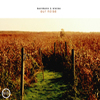 "Our Noise"? Anything but. From the opening notes of this release, I was sold. This is the debut full length from Hermann and Kleine, recorded in their bedrooms in Berlin. This is really un-German sounding electronic music, created with laptops and samples, and named "plinkerpop" as a genre, I'm told. True, it does have its moments of pop splendor, but I don't remember enjoying an electronic record this much since Four Tet's "Pause". It's not as boring as Kleine's work on his own tends to be these days, that's for sure. The beats are meaty in areas, simple in others, and the keyboards and samples laid on top of them are unobtrusive, often engrossing, and totally fresh. Each track stands on its own, and has a life of its own, even though they may have similar structures or sound effects. The album opener, 'Drop', is a perfect indicator of what the record is going to be about. A simple beat starts the track, then the bassline joins, and then distorted guitar. Before you know it, you're completely lost in a trance, moving along to the music like you don't know what's hit you. And it never stops or disappoints. The full beat eventually drops in on 'Drop', paving the way for the harder beats you'll hear on later tracks, but firmly engrained in the groove of the moment. 'Her Tune' starts out similarly deceptive, with simple keyboards, until the big beat joins in. It's all very impressive and easy to listen to for a variety of activities. Elsewhere, shuffling beats and big loud rock guitars are used to get the point across, or, as on 'Shuttle', a voice is heard on occasion, although extremely processed and edited. When it was all over, I started it up to listen to it a second time. A great first full-length release from this unlikely duo. - Rob Devlin
"Our Noise"? Anything but. From the opening notes of this release, I was sold. This is the debut full length from Hermann and Kleine, recorded in their bedrooms in Berlin. This is really un-German sounding electronic music, created with laptops and samples, and named "plinkerpop" as a genre, I'm told. True, it does have its moments of pop splendor, but I don't remember enjoying an electronic record this much since Four Tet's "Pause". It's not as boring as Kleine's work on his own tends to be these days, that's for sure. The beats are meaty in areas, simple in others, and the keyboards and samples laid on top of them are unobtrusive, often engrossing, and totally fresh. Each track stands on its own, and has a life of its own, even though they may have similar structures or sound effects. The album opener, 'Drop', is a perfect indicator of what the record is going to be about. A simple beat starts the track, then the bassline joins, and then distorted guitar. Before you know it, you're completely lost in a trance, moving along to the music like you don't know what's hit you. And it never stops or disappoints. The full beat eventually drops in on 'Drop', paving the way for the harder beats you'll hear on later tracks, but firmly engrained in the groove of the moment. 'Her Tune' starts out similarly deceptive, with simple keyboards, until the big beat joins in. It's all very impressive and easy to listen to for a variety of activities. Elsewhere, shuffling beats and big loud rock guitars are used to get the point across, or, as on 'Shuttle', a voice is heard on occasion, although extremely processed and edited. When it was all over, I started it up to listen to it a second time. A great first full-length release from this unlikely duo. - Rob Devlin
samples:
PREFUSE73, "The '92 vs '02 Collection"
Warp
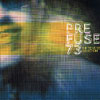 This four-track EP, the third release from Scott Herren on the Warp label under his Prefuse 73 alias, makes for a broad yet fleeting assortment of instrumental HipHop inspired music. The absence of vocalists and/or MCs has the listener focused on the behind the scenes make-up of some great compositions. Not to say that the right vocalists and/or MCs wouldn't enhance things, as evident on 2001's "Vocal Studies + Uprock Narratives." The opening track "Desks.Pencils.Bottles" names the elements used to provide the busy melodic percussion and distant drones, anchored with a synth-heavy bassline and a shuffle rhythm (coupled with a human beatbox) which skips the tune along perfectly. "When Irony Wears Thin" kicks it with the big band-esque shots of a reworked horn section over Moogish sounds and the bells, bips and bleeps of a gear-shifting rhythm track. "It Never Entered" lays down an "old school" styled funk groove as the base for the calm and collected sampled progressions of what sounds like a choir, eventually going to a serene half-time feel. "Love You Bring" closes off the disc with a sampled string section, acoustic guitar, droning keyboards and some pleasant female vocal clippings over a groove with a kick drum that'll get you right in the chest. Being called a collection, one may expect a lot more than four tracks over a ten year period. This may be that Mr. Herren has been a busy guy with his other projects (Savath+Savalas, Eastern Developments label) which differ from Prefuse to accumulate a lot of extra material. Here's hoping for another full lengther. - Gord Fynes
This four-track EP, the third release from Scott Herren on the Warp label under his Prefuse 73 alias, makes for a broad yet fleeting assortment of instrumental HipHop inspired music. The absence of vocalists and/or MCs has the listener focused on the behind the scenes make-up of some great compositions. Not to say that the right vocalists and/or MCs wouldn't enhance things, as evident on 2001's "Vocal Studies + Uprock Narratives." The opening track "Desks.Pencils.Bottles" names the elements used to provide the busy melodic percussion and distant drones, anchored with a synth-heavy bassline and a shuffle rhythm (coupled with a human beatbox) which skips the tune along perfectly. "When Irony Wears Thin" kicks it with the big band-esque shots of a reworked horn section over Moogish sounds and the bells, bips and bleeps of a gear-shifting rhythm track. "It Never Entered" lays down an "old school" styled funk groove as the base for the calm and collected sampled progressions of what sounds like a choir, eventually going to a serene half-time feel. "Love You Bring" closes off the disc with a sampled string section, acoustic guitar, droning keyboards and some pleasant female vocal clippings over a groove with a kick drum that'll get you right in the chest. Being called a collection, one may expect a lot more than four tracks over a ten year period. This may be that Mr. Herren has been a busy guy with his other projects (Savath+Savalas, Eastern Developments label) which differ from Prefuse to accumulate a lot of extra material. Here's hoping for another full lengther. - Gord Fynes
samples:
MAPSTATION, "A Way to Find the Day"
Staubgold
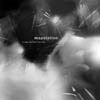 To Rococo Rot's Stefan Schneider is Mapstation, the solo project in which the bassist focuses more on the layering of electro sounds and textures. At times minimalist in approach, this third disc continues in the direction of an interesting compositional style. The introduction of what at first appears as simple sounding ideas are subtly built upon using various rhythms, synth patches and digital found sounds until they have formed a beautiful soundscape. Each of the disc's eleven tracks has a unique development and outcome. "Two Landscapes" opens with deep and lilting synth tones which act as a percussive element while various patches drift in and out stating a general melody and motif. "More People Than Two" is comprised of a lullaby-sounding repetitive keyboard with a bassline that weaves nicely into the mix of ethereal chords and distant pulses. Reggae singer Ras Donovan guests on the tracks "New Direction" (released as a 12") and "Wake Up," which could be seen as minimalist dub, maintaining the rhythmic keyboard of the style. This is definitely one for the headphones. - Gord Fynes
To Rococo Rot's Stefan Schneider is Mapstation, the solo project in which the bassist focuses more on the layering of electro sounds and textures. At times minimalist in approach, this third disc continues in the direction of an interesting compositional style. The introduction of what at first appears as simple sounding ideas are subtly built upon using various rhythms, synth patches and digital found sounds until they have formed a beautiful soundscape. Each of the disc's eleven tracks has a unique development and outcome. "Two Landscapes" opens with deep and lilting synth tones which act as a percussive element while various patches drift in and out stating a general melody and motif. "More People Than Two" is comprised of a lullaby-sounding repetitive keyboard with a bassline that weaves nicely into the mix of ethereal chords and distant pulses. Reggae singer Ras Donovan guests on the tracks "New Direction" (released as a 12") and "Wake Up," which could be seen as minimalist dub, maintaining the rhythmic keyboard of the style. This is definitely one for the headphones. - Gord Fynes
samples:
"Misery Loves Company"
Ersatz Audio
 The electro of Ersatz Audio's 'Misery Loves Company' comp is pretty damn thin. I don't really understand why, because all these artists (Adult., G.D.Luxxe, Solvent, Gold Chains, etc) should be interested in quality of sound, since they are, essentially, electronic musicians. But the beats on this CD are SCRAWNY, and I don't know if it's the minimal aspect of these tracks (most songs are just a drum machine and one or two synth lines, with vox), or if Ersatz needs to start getting their CDs mastered somewhere else (the Adult. full-length has a similar lack of punch). Or perhaps my ear is getting a little too picky. In any case, sound quality aside, this compilation is fairly enjoyable but somewhat forgettable. There's nothing groundbreaking going on here, but 'Misery Loves Company' has done a pretty good job of compiling artists from America and Europe whose approach to their drum machines and sequencers are roughly on the same wavelength: simple retro-dance-electro, with a big nod to the Detroit sound (and a small nod to Miami) and a slightly ironic presense. The obvious names stand out with some of the best tracks (DMX Krew's "Touch Me" and Lowfish's IDM-electro instrumental "Dead House"), but there are some intriguing new names here, including Detroit's Tamion 12 Inch, whose "Thin Boys Murdered" straddles the line between being really irritating and strangely charming. Other bigger names fail to deliver quality tracks, most notably Solvent & Skanfrom's collaboration "Expect Delays" and Gold Chains "Could Care Less," which is the purported inspiration for this disc. At its worst, this comp is a kind of redundant after a while, as every song sounds pretty much the same. But most of this music doesn't take itself too seriously, thankfully, and overall it's pretty non-intrusive. I'd probably put it on at a party. Or maybe play it really loud while taking a nap.
- Nate Smith The electro of Ersatz Audio's 'Misery Loves Company' comp is pretty damn thin. I don't really understand why, because all these artists (Adult., G.D.Luxxe, Solvent, Gold Chains, etc) should be interested in quality of sound, since they are, essentially, electronic musicians. But the beats on this CD are SCRAWNY, and I don't know if it's the minimal aspect of these tracks (most songs are just a drum machine and one or two synth lines, with vox), or if Ersatz needs to start getting their CDs mastered somewhere else (the Adult. full-length has a similar lack of punch). Or perhaps my ear is getting a little too picky. In any case, sound quality aside, this compilation is fairly enjoyable but somewhat forgettable. There's nothing groundbreaking going on here, but 'Misery Loves Company' has done a pretty good job of compiling artists from America and Europe whose approach to their drum machines and sequencers are roughly on the same wavelength: simple retro-dance-electro, with a big nod to the Detroit sound (and a small nod to Miami) and a slightly ironic presense. The obvious names stand out with some of the best tracks (DMX Krew's "Touch Me" and Lowfish's IDM-electro instrumental "Dead House"), but there are some intriguing new names here, including Detroit's Tamion 12 Inch, whose "Thin Boys Murdered" straddles the line between being really irritating and strangely charming. Other bigger names fail to deliver quality tracks, most notably Solvent & Skanfrom's collaboration "Expect Delays" and Gold Chains "Could Care Less," which is the purported inspiration for this disc. At its worst, this comp is a kind of redundant after a while, as every song sounds pretty much the same. But most of this music doesn't take itself too seriously, thankfully, and overall it's pretty non-intrusive. I'd probably put it on at a party. Or maybe play it really loud while taking a nap.
- Nate Smith
samples:
pia fraus, "in solarium"
Clairecords
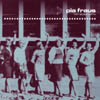 I really do sincerely hate name-dropping in music reviews, however, it's impossible to get around this one, like a dead animal on the sidewalk you simply can't ignore and have to step over. To their credit, this Estonian group has come closer than anyone in making an album sound just like 1990's 'Loveless' by My Bloody Valentine for their second full-lengther, and it's hardly surprising that the label to release this mentions Slowdive in over half of their band's web pages on their site. It's so strikingly similar from the pretty fuzz, through the male and female soft vocals, down to the usage of a buried drum machine on the final cuts. Give them a break, however, as each member was only 9 years old in 1990, therefore the chances of them ever seeing a band live who has had such an apparently profound influence on them are quite slim. The band sounds amazingly direct and sincere, however, and the tunes are indeed catchy and full of proverbial distorted guitar, in a mesmerising fuzz like the glaze covering your eyes on a hot, cloudy, yet rainless day. Much like a number of releases on Claire, songs can easily be picked apart and stand strong on their own amidst an ocean of variety but a collection of ten of these in a row with so much in common can be only be, at worst, slightly cumbersome to wade through. - Jon Whitney
I really do sincerely hate name-dropping in music reviews, however, it's impossible to get around this one, like a dead animal on the sidewalk you simply can't ignore and have to step over. To their credit, this Estonian group has come closer than anyone in making an album sound just like 1990's 'Loveless' by My Bloody Valentine for their second full-lengther, and it's hardly surprising that the label to release this mentions Slowdive in over half of their band's web pages on their site. It's so strikingly similar from the pretty fuzz, through the male and female soft vocals, down to the usage of a buried drum machine on the final cuts. Give them a break, however, as each member was only 9 years old in 1990, therefore the chances of them ever seeing a band live who has had such an apparently profound influence on them are quite slim. The band sounds amazingly direct and sincere, however, and the tunes are indeed catchy and full of proverbial distorted guitar, in a mesmerising fuzz like the glaze covering your eyes on a hot, cloudy, yet rainless day. Much like a number of releases on Claire, songs can easily be picked apart and stand strong on their own amidst an ocean of variety but a collection of ten of these in a row with so much in common can be only be, at worst, slightly cumbersome to wade through. - Jon Whitney
samples:
Ekkehard Ehlers, "Plays"
Staubgold
 The "Plays" project came out over the course of 2001 on Bottrop-Boy (two 7" singles) and Staubgold (three mini-LPs). Each release in the series consisted of two tracks. This CD is a handy way to get them all at once, and perhaps to understand the project more coherently. While there's little information in the insert for those of us who can't read German, it's not hard to guess, given Ehlers's past form—particularly his membership of the defunct high-concept Mille Plateaux act Autopoieses—that there'll be some thinking behind it.
The "Plays" project came out over the course of 2001 on Bottrop-Boy (two 7" singles) and Staubgold (three mini-LPs). Each release in the series consisted of two tracks. This CD is a handy way to get them all at once, and perhaps to understand the project more coherently. While there's little information in the insert for those of us who can't read German, it's not hard to guess, given Ehlers's past form—particularly his membership of the defunct high-concept Mille Plateaux act Autopoieses—that there'll be some thinking behind it.
The Staubgold site helpfully offers this quotation from Ehlers: "The 'Plays' series deals with 'reference' ... Everyone is sampling; sampling is the figure of historic devices in digital music. My idea is not to sample, but to refer to historic places and figures." And so he refers not only to musicians (Albert Ayler, Cornelius Cardew, and Robert Johnson) but to actor and director John Cassavetes, and the enigmatic Hubert Fichte, who is variously documented on the web as a queer theorist, an anthropologist, and a beat poet.
These referential intentions work well for the most part, reversing the usual process of listening to music based on sampled material: instead of noticing or just assuming I'm hearing "quotations" from other music, I've tried to decode it using my knowledge—however pitiful at times—of its subject.
Thankfully, though it may enrich it, knowledge of the five subjects' biographies is not essential to appreciating the music. "Plays Cornelius Cardew", one of the 7"s, and "Plays John Cassavetes", one of the mini-LPs, are basically drone and loop-based, using organs and violins—sometimes as walls of sound, others more sparsely. Ehlers takes a much more interesting approach on the "Plays Albert Ayler" and "Plays Hubert Fichte" mini-LPs, confidently subjecting raw recordings to his digital knife. These are the must-listen highlights of the CD. "Plays Hubert Fichte" puts lazily picked guitar from Joseph Suchy in the background of a night chorus of buzzing and chirping modifications, like improvisation overheard on a hot evening. The meticulously arranged "Plays Albert Ayler" uses similar processing techniques but, being based on Anka Hirsch's cello and other orchestral instrumentation, is more austere and graceful. You may have heard this sort of thing before, but here it's done with a taste and judgment that's far from common.
The CD closes with the "Plays Robert Johnson" 7", one side processed guitar fumbling, and the other a micro-house funk-out that's funny but definitely out of character with the rest of the series. Nonetheless, it adds to the diversity of this occasionally inspired collection, which confirms Ehlers as one of the best musicians working at the theory-heavy end of the post-digital scene. - Andrew Shires
samples:
DOWNLOAD, "III STEPS FORWARD"
Subconscious Communications
 After 1997's unimaginatively entitled third album, Download planned on releasing two EPs ('Moth' and 'Resilient' if memory serves) that never came to be. More than likely some if not all of the material for those has resurfaced here, along with 'Effector' outtakes, on the third installment of the "From the Vault" series. From the get go I'm impressed as these are finished tracks on par with or better than those that made the official releases, unlike the lifeless doodlings of the first Vault disc "Inception". "Sticky Glandstin" has all the essentials: a jittery bass heavy beat, bizarre samples and sounds and an amniotic atmosphere smeared across the stereo field. The next track "Dakota" is the first jaw dropper when it shifts gears and glides into an elegant synthetic wash. Rhythmically "The Itch of Trepanning" swaggers and "Manmade" assaults while "Nor" caresses (it too dissolving into a howl enhanced ambient bliss midway through). "Walking, Talking" also beats you pleasantly senseless with an intricate mesh of metallic percussion and electronic squelches over a groovy bass lead. "D.O.G." and "P.U.P." reference Key's longtime feline companions to which this 45 minute collection is dedicated. With that in mind both take on a somewhat somber but thankful air, the rhythms tamed down some to focus more on melodic feel. If you're remotely a fan of post-'The Eyes of Stanley Pain' Download, 'III Steps Forward' is very worth your while. - Mark Weddle
After 1997's unimaginatively entitled third album, Download planned on releasing two EPs ('Moth' and 'Resilient' if memory serves) that never came to be. More than likely some if not all of the material for those has resurfaced here, along with 'Effector' outtakes, on the third installment of the "From the Vault" series. From the get go I'm impressed as these are finished tracks on par with or better than those that made the official releases, unlike the lifeless doodlings of the first Vault disc "Inception". "Sticky Glandstin" has all the essentials: a jittery bass heavy beat, bizarre samples and sounds and an amniotic atmosphere smeared across the stereo field. The next track "Dakota" is the first jaw dropper when it shifts gears and glides into an elegant synthetic wash. Rhythmically "The Itch of Trepanning" swaggers and "Manmade" assaults while "Nor" caresses (it too dissolving into a howl enhanced ambient bliss midway through). "Walking, Talking" also beats you pleasantly senseless with an intricate mesh of metallic percussion and electronic squelches over a groovy bass lead. "D.O.G." and "P.U.P." reference Key's longtime feline companions to which this 45 minute collection is dedicated. With that in mind both take on a somewhat somber but thankful air, the rhythms tamed down some to focus more on melodic feel. If you're remotely a fan of post-'The Eyes of Stanley Pain' Download, 'III Steps Forward' is very worth your while. - Mark Weddle
samples:
E.G OBLIQUE GRAPH, "COMPLETELY OBLIQUE"
Pretentious (The Label)
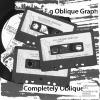 Prior to one hundred and forty-some (and counting) releases as Muslimgauze, Bryn Jones was known as E.g Oblique Graph. This limited edition set of 201 collects all of the tracks from the very rare cassette and vinyl releases: 1982's 'Extended Play', 'Piano Room' and 'Triptych' and 1983's 'Inhalt'. What's on these two black CD-Rs bears little to no resemblance to trademark Muslimgauze. It's rather sparse and primal electronic music with a DIY attitude typical of the late '70s and early '80s. Jones plunked about and droned on synths, mixed in various tape recordings and some pseudo-beats and lets it all churn within effects. The more dark or abstract the more interesting: marred choirs and speech, reversed and otherwise manipulated tapes, electric discharges, sonar-like pings, seemingly random juxtapositions, etc. "Human Rights" is probably the first track (in title, at least) to address a socio-political concern while the final (and my favorite) track of disc one, the 20 plus minute "Piano Room", seems to be the first to utilize a drum machine amongst its varied movements. Israel's 1982 invasion of Lebanon brought about a paradigm shift in Jones' inspiration, as evidenced by the titles of the two tracks that made up the "Inhalt" cassette: "Islamic Koran In Camera Dome" and "Rapid White Flag In Snapshot Blur". The blood is beginning to boil in the former as an upfront rhythm dominates most of the nearly nine minutes. Soon after this began Muslimgauze. 'Completely Oblique' isn't all that exciting really, more of a historical footnote for Muslimgauze collectors. Though I do have a soft spot for this sort of amateur music making, having done it myself for a few years, I don't even listen to my own tapes anymore. The liner notes make it pretty clear that Jones wasn't too interested in revisiting this or other past work either. So while I'm grateful for the chance to finally hear it, I also have to wonder if re-issuing it was the right thing to do. - Mark Weddle
Prior to one hundred and forty-some (and counting) releases as Muslimgauze, Bryn Jones was known as E.g Oblique Graph. This limited edition set of 201 collects all of the tracks from the very rare cassette and vinyl releases: 1982's 'Extended Play', 'Piano Room' and 'Triptych' and 1983's 'Inhalt'. What's on these two black CD-Rs bears little to no resemblance to trademark Muslimgauze. It's rather sparse and primal electronic music with a DIY attitude typical of the late '70s and early '80s. Jones plunked about and droned on synths, mixed in various tape recordings and some pseudo-beats and lets it all churn within effects. The more dark or abstract the more interesting: marred choirs and speech, reversed and otherwise manipulated tapes, electric discharges, sonar-like pings, seemingly random juxtapositions, etc. "Human Rights" is probably the first track (in title, at least) to address a socio-political concern while the final (and my favorite) track of disc one, the 20 plus minute "Piano Room", seems to be the first to utilize a drum machine amongst its varied movements. Israel's 1982 invasion of Lebanon brought about a paradigm shift in Jones' inspiration, as evidenced by the titles of the two tracks that made up the "Inhalt" cassette: "Islamic Koran In Camera Dome" and "Rapid White Flag In Snapshot Blur". The blood is beginning to boil in the former as an upfront rhythm dominates most of the nearly nine minutes. Soon after this began Muslimgauze. 'Completely Oblique' isn't all that exciting really, more of a historical footnote for Muslimgauze collectors. Though I do have a soft spot for this sort of amateur music making, having done it myself for a few years, I don't even listen to my own tapes anymore. The liner notes make it pretty clear that Jones wasn't too interested in revisiting this or other past work either. So while I'm grateful for the chance to finally hear it, I also have to wonder if re-issuing it was the right thing to do. - Mark Weddle
samples:
Hot Hot Heat, "Knock Knock Knock"
Sub Pop
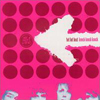 The music industry, like most industries built on commerce, tends to move in cyclic patterns known to many as "trends." These "trends" are disturbing only in the fact that they tend to rob the consumer of any clear original thought. "Here, America! That other album by that other band on that other label was good, huh? Well now, we, a completely different label, bring you an artist that's pretty similar! What do you think?" After the huge success of the Strokes and other bands with a retro-but-not-really sound, the race was on to find the next band with the sound of yestermorrow. Here they are, from Sub Pop, Hot Hot Heat! After a single on Sub Pop and a whole album on Ohev, "Knock Knock Knock" is a five song EP to whet the listener's appetite for the eventual full-length on Sub Pop. And, yes, Hot Hot Heat have a sound that is easily derivative, recalls other eras of musical, and still tries to sound original and new. It doesn't. Their sound is supposedly supposed to combine the best elements of the most popular music from the past three decades. And Hot Hot Heat does that pretty well. Unfortunately, it's not all that interesting to listen to. The first track, 'Le Le Low', features a thumping bassline, Power Station-like drums, and vocals that sound like the bastard child of Iggy Pop and Danny Elfman singing "where's all your passion gone?/where's all your fashion gone?" Together, it all sounds like a new wave band that woke up twenty years later to be produced by Bob Rock. And "Knock Knock Knock" never really does anything more than that. In this race to find the next band that will bring relevance to past decades with music of today, Hot Hot Heat and Sub Pop are behind the leader by some distance, and it's unclear whether they'll be able to catch up. - Rob Devlin
The music industry, like most industries built on commerce, tends to move in cyclic patterns known to many as "trends." These "trends" are disturbing only in the fact that they tend to rob the consumer of any clear original thought. "Here, America! That other album by that other band on that other label was good, huh? Well now, we, a completely different label, bring you an artist that's pretty similar! What do you think?" After the huge success of the Strokes and other bands with a retro-but-not-really sound, the race was on to find the next band with the sound of yestermorrow. Here they are, from Sub Pop, Hot Hot Heat! After a single on Sub Pop and a whole album on Ohev, "Knock Knock Knock" is a five song EP to whet the listener's appetite for the eventual full-length on Sub Pop. And, yes, Hot Hot Heat have a sound that is easily derivative, recalls other eras of musical, and still tries to sound original and new. It doesn't. Their sound is supposedly supposed to combine the best elements of the most popular music from the past three decades. And Hot Hot Heat does that pretty well. Unfortunately, it's not all that interesting to listen to. The first track, 'Le Le Low', features a thumping bassline, Power Station-like drums, and vocals that sound like the bastard child of Iggy Pop and Danny Elfman singing "where's all your passion gone?/where's all your fashion gone?" Together, it all sounds like a new wave band that woke up twenty years later to be produced by Bob Rock. And "Knock Knock Knock" never really does anything more than that. In this race to find the next band that will bring relevance to past decades with music of today, Hot Hot Heat and Sub Pop are behind the leader by some distance, and it's unclear whether they'll be able to catch up. - Rob Devlin
samples:
+/-
Teenbeat
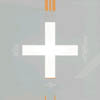 For years, singer/songwriter/New Yorker James Balyut has fronted the group Versus, cranking out a parade of critically-acclaimed rocking pop records. With this self-titled long-paying debut album, Balyut has stepped out, almost entirely alone, into the playing field of this decade, merging crafty tunemanship with a heap of drum machines, electronics, and a super clean production that's only ever slightly rough around the edges. When it's good, it can get really, really awesome, with feverishly catchy tunes like "The Queen of Detroit," and the slow but undeniably forceful, "The Declaration of Independence," and somewhat sexily messy bursts in "All I Have to Do is Make You." Balyut's acoustic fingerpicking skills are highlighted in numerous songs, including "The Industrial Revolution," a tune to bring a smile to nearly any David Grubbs fan with a vocal style that has most likely given people like Sam Prekop and Marcus Acher more confidence to sing with their timid voices. However, some of the slower moments, like the album's opening and the cringeful repetition of "Yo Yo Yo," can be more embarassing than listening to Pet Shop Boys at loud volumes in public. When a four-piece group is assembled for live shows, the format is translated almost entirely over to standard rock instrumentation, and there's never a weak moment. Hopefully with future records, Balyut will be less wary of letting his teeth show, but for now, this rather quiet and laid-back record is more of a bold statement and could easily bode well with fans of the more electronic side of Clinic who ache for a lot more musical proficiency and no irony. - Jon Whitney
For years, singer/songwriter/New Yorker James Balyut has fronted the group Versus, cranking out a parade of critically-acclaimed rocking pop records. With this self-titled long-paying debut album, Balyut has stepped out, almost entirely alone, into the playing field of this decade, merging crafty tunemanship with a heap of drum machines, electronics, and a super clean production that's only ever slightly rough around the edges. When it's good, it can get really, really awesome, with feverishly catchy tunes like "The Queen of Detroit," and the slow but undeniably forceful, "The Declaration of Independence," and somewhat sexily messy bursts in "All I Have to Do is Make You." Balyut's acoustic fingerpicking skills are highlighted in numerous songs, including "The Industrial Revolution," a tune to bring a smile to nearly any David Grubbs fan with a vocal style that has most likely given people like Sam Prekop and Marcus Acher more confidence to sing with their timid voices. However, some of the slower moments, like the album's opening and the cringeful repetition of "Yo Yo Yo," can be more embarassing than listening to Pet Shop Boys at loud volumes in public. When a four-piece group is assembled for live shows, the format is translated almost entirely over to standard rock instrumentation, and there's never a weak moment. Hopefully with future records, Balyut will be less wary of letting his teeth show, but for now, this rather quiet and laid-back record is more of a bold statement and could easily bode well with fans of the more electronic side of Clinic who ache for a lot more musical proficiency and no irony. - Jon Whitney
samples:
UNPLUGBOY AND TOSHIMARU NAKAMURA
Alectro-Ecoustic
 Whilst Manchester's regular quiet improv and odd experimental night of rumbunctious shenanigans has gone into hibernation, its instigator Daniel Weaver (Unplugboy) keeps the soundwaves coming with a typically curiously presented double 3" CD. About a year back, Daniel took his cello input laptop on a trip around various British arthouses and dives, accompanying the drones, judders and high squeals of Japanese maestro of the no-input mixing desk, Toshimaru Nakamura. He's edited down his performances to one of these little CDs, and all his duets with Toshimaru Nakamura to the other one. By the time they reached Manchester, Daniel had dislodged the bridge from his cello and clipped crocodile clips all over the strings. The two of them were making almost no sound at all, and such was their pursual of minimal quietude, that it seemed Toshi's shadow on the wall might've become audible. It seems that some of the events in other cities rendered up some slightly noisier material, judging by these two little discs snuggled in their grey latex-foam wallet. The Unplugboy disc opens with sounds that resemble exerted panting breath, and soon a rhythmic door hinge squeak starts up. Slowly groans and drones of a more recognisably cellic nature arch around. Despite moves towards atonal abstraction, there always seems to be a rhythmic undertow, even if it's sometimes left unstated. Usually there's some kinda oddlooping goin' on. Cauldrons bubble and mystic organic sci-fi machines sing their breaking glitch-song. Perhaps Unplugboy's closest companion in laptop / string interface invention would be Kaffe Mathews, with whom he's performed in the past. Both have an interest in seeing just how far they can push their mutant stringsounds without having to resort to high volume onslaughts. Second track "Newcastle" slowly builds an eerie feel of an asthmatic witches coven summoning down elementals in an operating theatre. The "Chinese" helping of Unplugboy's collaboration with Toshimaru Nakamura is marked by much denser blocks of sound and high feedback squeals, under which the cellaptop makes little rumbles like a toy car in trouble. Imagine a life support machine for a being that breathes white noise and sine waves, exhaling them as regular sferic patterns that soon dissolve. The longest portion is "Indian" and opens with squeaker mousey jangles over mindfuck midrange drone-nasties. This is where they reach meltdown and the mice run screaming in circles from the mouse organ as it catches fire. The emergency klaxons peal then breakdown as the monitors smoke. Finally fractured dyslexic morse code blips into oblivion. The three inch CD format is perhaps in general underused and works very well here, leaving me wanting to hear more, and unfortunately the short sound files do a disservice to evolving soundscapes that should be heard in their entirety. - Graeme Rowland
Whilst Manchester's regular quiet improv and odd experimental night of rumbunctious shenanigans has gone into hibernation, its instigator Daniel Weaver (Unplugboy) keeps the soundwaves coming with a typically curiously presented double 3" CD. About a year back, Daniel took his cello input laptop on a trip around various British arthouses and dives, accompanying the drones, judders and high squeals of Japanese maestro of the no-input mixing desk, Toshimaru Nakamura. He's edited down his performances to one of these little CDs, and all his duets with Toshimaru Nakamura to the other one. By the time they reached Manchester, Daniel had dislodged the bridge from his cello and clipped crocodile clips all over the strings. The two of them were making almost no sound at all, and such was their pursual of minimal quietude, that it seemed Toshi's shadow on the wall might've become audible. It seems that some of the events in other cities rendered up some slightly noisier material, judging by these two little discs snuggled in their grey latex-foam wallet. The Unplugboy disc opens with sounds that resemble exerted panting breath, and soon a rhythmic door hinge squeak starts up. Slowly groans and drones of a more recognisably cellic nature arch around. Despite moves towards atonal abstraction, there always seems to be a rhythmic undertow, even if it's sometimes left unstated. Usually there's some kinda oddlooping goin' on. Cauldrons bubble and mystic organic sci-fi machines sing their breaking glitch-song. Perhaps Unplugboy's closest companion in laptop / string interface invention would be Kaffe Mathews, with whom he's performed in the past. Both have an interest in seeing just how far they can push their mutant stringsounds without having to resort to high volume onslaughts. Second track "Newcastle" slowly builds an eerie feel of an asthmatic witches coven summoning down elementals in an operating theatre. The "Chinese" helping of Unplugboy's collaboration with Toshimaru Nakamura is marked by much denser blocks of sound and high feedback squeals, under which the cellaptop makes little rumbles like a toy car in trouble. Imagine a life support machine for a being that breathes white noise and sine waves, exhaling them as regular sferic patterns that soon dissolve. The longest portion is "Indian" and opens with squeaker mousey jangles over mindfuck midrange drone-nasties. This is where they reach meltdown and the mice run screaming in circles from the mouse organ as it catches fire. The emergency klaxons peal then breakdown as the monitors smoke. Finally fractured dyslexic morse code blips into oblivion. The three inch CD format is perhaps in general underused and works very well here, leaving me wanting to hear more, and unfortunately the short sound files do a disservice to evolving soundscapes that should be heard in their entirety. - Graeme Rowland
samples:
Superdrag, "Last Call for Vitriol"
Arena Rock
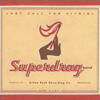 I still miss the Superdrag of old, but this incarnation gets better all the time. Last time we left our indie rock heroes, they put out a split single with the Anniversary that sort of redeemed the close to awful tour CD "Greetings from Tennessee." Their new album, Superdrag's second full-length for Arena Rock, opens with the first track from that EP, 'Baby Goes to Eleven.' Re-recorded, it sounds a hundred percent better, with Bob Pollard on backing vocals. A good start, though not as strong as the last album. After that, there is a track written and sung by bassist Sam Powers. This is why I miss the Superdrag of old. I like Sam enough, and his songs are good, but they'd be so much better off to pool their efforts. Namely, let John Davis do the singing, Sam. The strongest moments on this release are the songs that Davis pens and sings. After that comes the tracks co-written by all members save Mic Harrison, who I don't think has been in the band long enough to contribute. After that are Sam's songs. His second on the album, which he also sings, was also on "Greetings...", and it was pretty bad. It's better now, but not as strong a song in the Superdrag catalog. Will 'Stu' stack up against 'Sucked Out', 'Destination Ursa Major', 'Hellbent', 'Annetichrist', or 'Keep It Close to Me'? Nope. But 'The Staggering Genius' will. And 'Feeling Like I Do' is easily the best Superdrag song ever, with the most honest lyrics I feel Davis has ever uttered: "I just want you twisted with me, too/yeah yeah/I don't know what I've been tryin' to prove/yeah yeah/everytime I get too fucked to move." Honestly, low moments a side, this is the best Superdrag have sounded in years, and here's to hoping it keeps getting better. - Rob Devlin
I still miss the Superdrag of old, but this incarnation gets better all the time. Last time we left our indie rock heroes, they put out a split single with the Anniversary that sort of redeemed the close to awful tour CD "Greetings from Tennessee." Their new album, Superdrag's second full-length for Arena Rock, opens with the first track from that EP, 'Baby Goes to Eleven.' Re-recorded, it sounds a hundred percent better, with Bob Pollard on backing vocals. A good start, though not as strong as the last album. After that, there is a track written and sung by bassist Sam Powers. This is why I miss the Superdrag of old. I like Sam enough, and his songs are good, but they'd be so much better off to pool their efforts. Namely, let John Davis do the singing, Sam. The strongest moments on this release are the songs that Davis pens and sings. After that comes the tracks co-written by all members save Mic Harrison, who I don't think has been in the band long enough to contribute. After that are Sam's songs. His second on the album, which he also sings, was also on "Greetings...", and it was pretty bad. It's better now, but not as strong a song in the Superdrag catalog. Will 'Stu' stack up against 'Sucked Out', 'Destination Ursa Major', 'Hellbent', 'Annetichrist', or 'Keep It Close to Me'? Nope. But 'The Staggering Genius' will. And 'Feeling Like I Do' is easily the best Superdrag song ever, with the most honest lyrics I feel Davis has ever uttered: "I just want you twisted with me, too/yeah yeah/I don't know what I've been tryin' to prove/yeah yeah/everytime I get too fucked to move." Honestly, low moments a side, this is the best Superdrag have sounded in years, and here's to hoping it keeps getting better. - Rob Devlin
samples:
Soviet, "We Are Eyes, We Are Builders"
Mogul Electro
 'We Are Eyes, We Are Builders' was released last year on Ronnie Martin of Joy Electric's Plastiq Musiq label, but apparently Soviet have split with Plastiq and rereleased the album on Mogul Electro, which was responsible for the Electroclash comp (and NYC festival) of last fall. An interesting move; I wonder if it was Plastiq's poor distribution that made them jump ship. I've been really digging Soviet since last year when I unexpectedly caught them live in New York, just as the whole "electroclash" scene was picking up momentum, and I've been listening to the Plastiq version of this CD for months. What makes them stand out to me from most of the other electroclash stuff is the lack of pretention and posturing in their presence and the absence of angst and innuendo in the music. This probably has a lot to do with roots - unlike a lot of the electroclash bands, Soviet didn't come from the downtown scene; instead, the downtown scene found Soviet and embraced them. Soviet's songs are wholly influenced by the synth-driven 1980s, but instead of being specifically influenced by a particular group or genre, Soviet takes the best of the early-to-mid '80s as a whole; the fact that nearly every song on the album sounds like a hit single is a testament to the group's pop songwriting abilities, particularly of singer Keith Ruggiero and synth player Chris Otchy. The music is almost earnest in melody and lyrics, and Ruggerio obviously knows his way vocally around a song. Probably there is a bit of irony in the music and lyrics, but if it is, it's buried somewhere hard to find, and suprisingly, this lack of irony make the music even more likable. The recording quality is great, too - though obviously fully digital, the synth and drum machines are warm and full; this CD sounds excellent when played loud through a good stereo. This rerelease of the album replaces two tracks from the Plastiq version with two newer instrumentals, and the track listing has been completely reordered (though not necessarily for the better Ð "China," the original opener, was a superb beginning for this album, and now it's been delegated to the 10th spot out of 12). The songs have been also been remixed, and the most notable change is the addition of Kenan Gunduz's guitar on a number of tracks. In essence, this is probably a smart move, as it better reflects Soviet's live show, but to someone like me who's pretty familiar with the original release, some of the guitar seems tacked on. But perhaps I'm just not used to it, and a fresh listener might not detect anything weird. Regardless, I think this album is leagues ahead of the rest of the electroclash pack. When compared with most of their peers, Soviet's songs are more skillfully written and recorded, and they better reflect their influences without falling into territory that's too derivative. If you like any of the more popular electroclash outfits,ÊI highly recommend checking out this CD, though I might still harbor a preference for the original Plastiq Musiq version.
- Nate Smith 'We Are Eyes, We Are Builders' was released last year on Ronnie Martin of Joy Electric's Plastiq Musiq label, but apparently Soviet have split with Plastiq and rereleased the album on Mogul Electro, which was responsible for the Electroclash comp (and NYC festival) of last fall. An interesting move; I wonder if it was Plastiq's poor distribution that made them jump ship. I've been really digging Soviet since last year when I unexpectedly caught them live in New York, just as the whole "electroclash" scene was picking up momentum, and I've been listening to the Plastiq version of this CD for months. What makes them stand out to me from most of the other electroclash stuff is the lack of pretention and posturing in their presence and the absence of angst and innuendo in the music. This probably has a lot to do with roots - unlike a lot of the electroclash bands, Soviet didn't come from the downtown scene; instead, the downtown scene found Soviet and embraced them. Soviet's songs are wholly influenced by the synth-driven 1980s, but instead of being specifically influenced by a particular group or genre, Soviet takes the best of the early-to-mid '80s as a whole; the fact that nearly every song on the album sounds like a hit single is a testament to the group's pop songwriting abilities, particularly of singer Keith Ruggiero and synth player Chris Otchy. The music is almost earnest in melody and lyrics, and Ruggerio obviously knows his way vocally around a song. Probably there is a bit of irony in the music and lyrics, but if it is, it's buried somewhere hard to find, and suprisingly, this lack of irony make the music even more likable. The recording quality is great, too - though obviously fully digital, the synth and drum machines are warm and full; this CD sounds excellent when played loud through a good stereo. This rerelease of the album replaces two tracks from the Plastiq version with two newer instrumentals, and the track listing has been completely reordered (though not necessarily for the better Ð "China," the original opener, was a superb beginning for this album, and now it's been delegated to the 10th spot out of 12). The songs have been also been remixed, and the most notable change is the addition of Kenan Gunduz's guitar on a number of tracks. In essence, this is probably a smart move, as it better reflects Soviet's live show, but to someone like me who's pretty familiar with the original release, some of the guitar seems tacked on. But perhaps I'm just not used to it, and a fresh listener might not detect anything weird. Regardless, I think this album is leagues ahead of the rest of the electroclash pack. When compared with most of their peers, Soviet's songs are more skillfully written and recorded, and they better reflect their influences without falling into territory that's too derivative. If you like any of the more popular electroclash outfits,ÊI highly recommend checking out this CD, though I might still harbor a preference for the original Plastiq Musiq version.
- Nate Smith
samples:
We know that sometimes these CDs are somewhat challenging to find, which is why we have a community section which can be used to obtain nearly everything available on this site. |